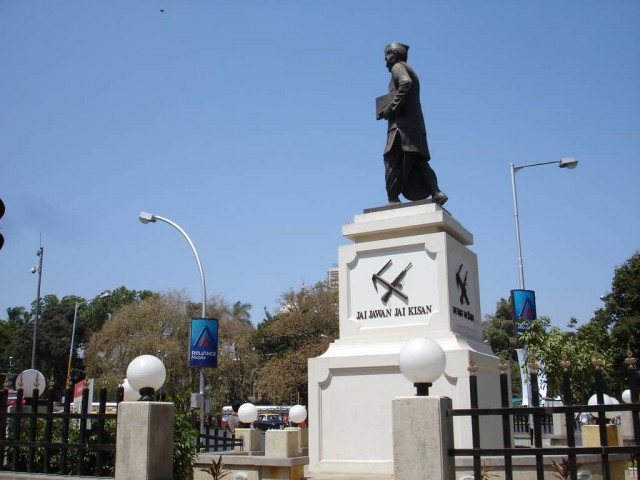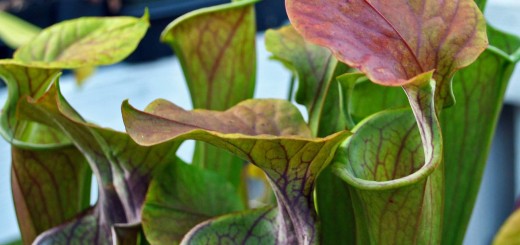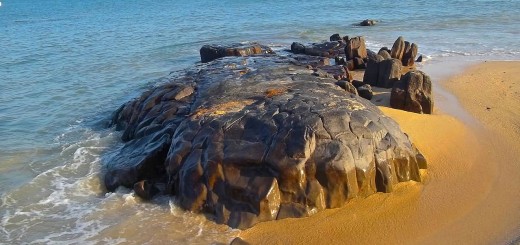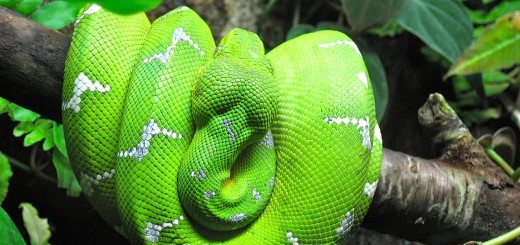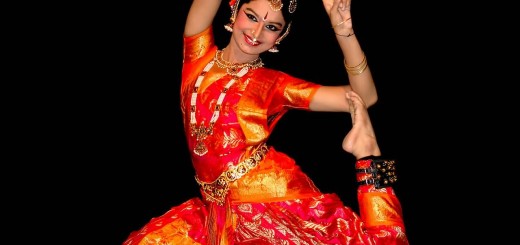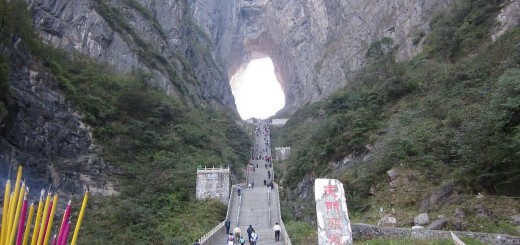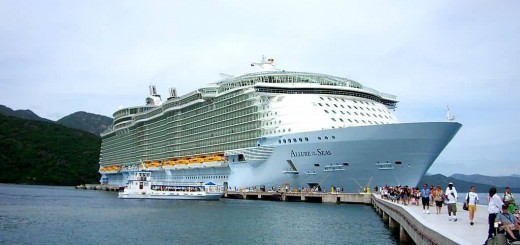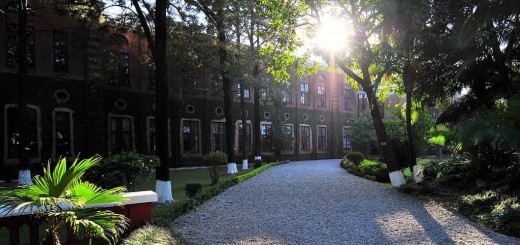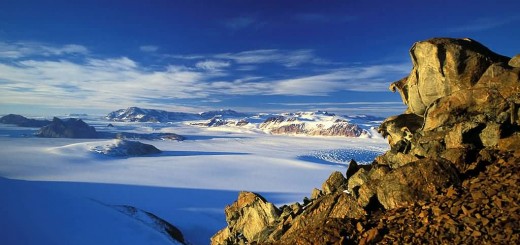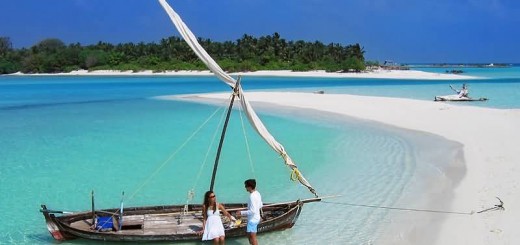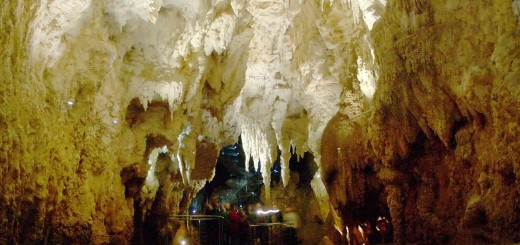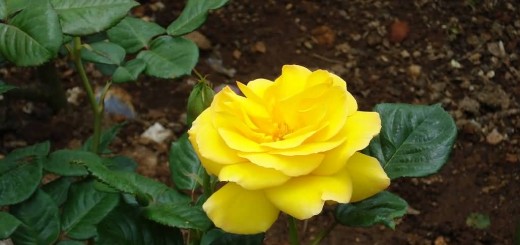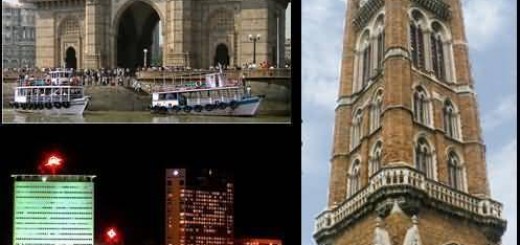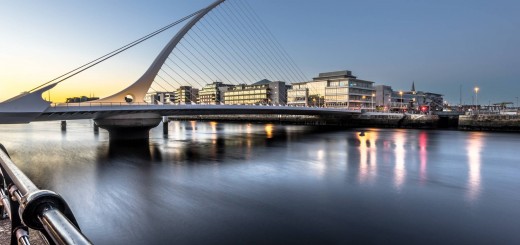Did You Know The 15 Prime Ministers Of India After Independence?
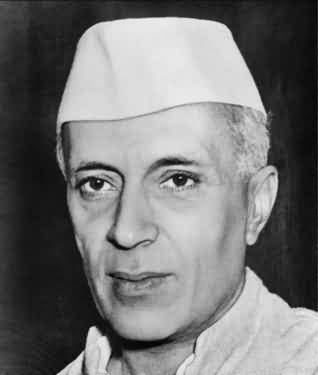
Jawaharlal Nehru (Photo Credit: Royroydeb / Public Domain)
Jawaharlal Nehru
Jawaharlal Nehru was the first Prime Minister of India and a central figure in Indian politics for much of the 20th century. He emerged as the paramount leader of the Indian independence movement under the tutelage of Mahatma Gandhi and ruled India from its establishment as an independent nation in 1947 until his death in office in 1964. Nehru is considered to be the architect of the modern Indian nation-state: a sovereign, socialist, secular and democratic republic.

Jawaharlal Nehru (Photo Credit: India7 Network / CC BY 2.0)
During his lifetime he was popularly known as Pandit Nehru or as Panditji, while many Indian children knew him as “Chacha Nehru”. Nehru and the Congress dominated Indian politics during the 1930s as the country moved towards independence. His idea of a secular nation-state was seemingly validated when the Congress under his leadership swept the 1937 provincial elections and formed the government in several provinces. Chiefly he oversaw India’s transition from a monarchy to a republic while nurturing a plural multi-party democracy.
In foreign policy Nehru took a leading role in Non-Alignment while projecting India as a regional hegemon in South Asia. Under Nehru’s leadership the Congress emerged as a catch-all party dominating national and state-level politics and winning consecutive elections in 1951, 1957 and 1962. He remained popular with the people of India in spite of political troubles in his final years and failure of leadership during the 1962 Sino-Indian War. In India his birthday is celebrated as Children’s Day.
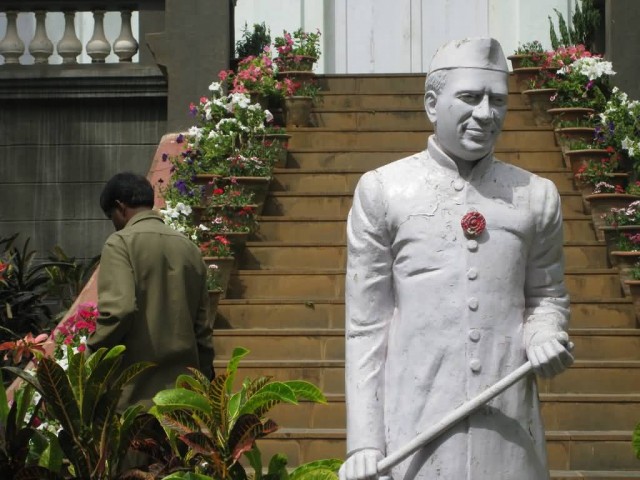
Statue Of Jawaharlal Nehru (Photo Credit: Phil Whitehouse / CC BY 2.0)
Lal Bahadur Shastri
Lal Bahadur Shastri was the Second Prime Minister of the Republic of India and a leader of the Indian National Congress party. Following independence in 1947 he joined the latter’s government and became one of Prime Minister Nehru’s principal lieutenants first as Railways Minister and then in a variety of other functions including Home Minister. In 1951 Shastri was made the General Secretary of the All-India Congress Committee with Jawaharlal Nehru as the Prime Minister. He was directly responsible for the selection of candidates and the direction of publicity and electioneering activities.
As the Railway Minister Shastri installed the 1st Machine at Integral Coach Factory ICF Chennai on 20.02.1955. In his first broadcast as Prime Minister, on 11 June 1964, Shastri stated that “There comes a time in the life of every nation when it stands at the cross-roads of history and must choose which way to go. But for us there need be no difficulty or hesitation, no looking to right or left. Our way is straight and clear-the building up of a socialist democracy at home with freedom and prosperity for all, and the maintenance of world peace and friendship with all nations”.
Shri Lal Bahadur Shastri’s slogan “Jai Jawan! Jai Kishan!!” reverberates even today through the length and breadth of the country. Underlying this is the inner-most sentiments “Jai Hind”. Prime Minister Shastri was murdered in Tashkent the day after signing the Tashkent Declaration reportedly due to a heart attack but people allege conspiracy behind the death. He was eulogised as a national hero and the Vijay Ghat memorial established in his memory.
Gulzarilal Nanda
Gulzarilal Nanda was an Indian politician and economist who specialized in labour issues. Nanda was born on 4 July 1898 in Sialkot in the Punjab Province of British India into a Punjabi Hindu family. Nanda received his education in Lahore, Amritsar, Agra and Allahabad. He was the Prime Minister of India for two short periods following the deaths of Jawaharlal Nehru in 1964 and Lal Bahadur Shastri in 1966. Both his terms ended after the ruling Indian National Congress parliamentary party elected a new prime minister.
He was awarded the Bharat Ratna India’s highest civilian award in 1997. In the British Raj Nanda was elected to the Bombay Legislative Assembly in 1937, and served as parliamentary secretary to the Government of Bombay from 1937 to 1939. As Labour Minister of the Bombay Government during 1946–50 he successfully piloted the Labor Disputes Bill in the state assembly. He served as a Trustee of the Kasturba Memorial Trust. He served as secretary of the Hindustan Mazdoor Sevak Sangh and Chairman of the Bombay Housing Board. He was a member of the National Planning Committee. He was largely instrumental in organising the Indian National Trade Union Congress and later became its president.
Indira Gandhi
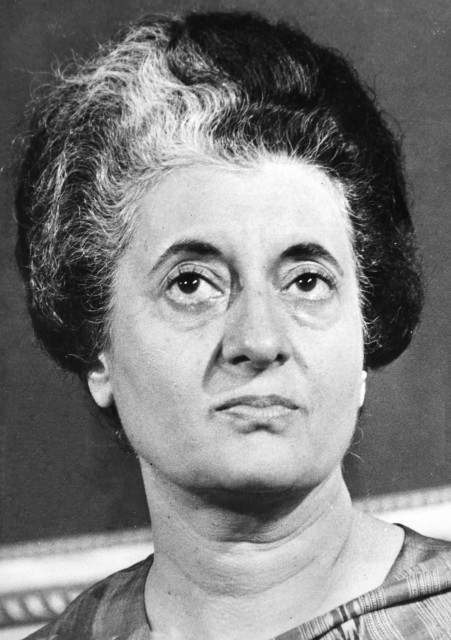
Indira Gandhi (Photo Credit: Wikipedia / CC BY-SA 3.0)
Indira Priyadarshini Gandhi was the fourth Prime Minister of India and a central figure of the Indian National Congress party. Gandhi, who served from 1966 to 1977 and then again from 1980 until her assassination in 1984, is the second-longest-serving Prime Minister of India and the only woman to hold the office. Indira Gandhi was the only child of the first Indian Prime Minister, Jawaharlal Nehru. She served as the Chief of Staff of her father’s highly centralised administration between 1947 and 1964 and came to wield considerable unofficial influence in government. She was elected Congress President in 1959.
Upon her father’s death in 1964 Gandhi refused to enter Congress party leadership contest and instead chose to become a cabinet minister in the government led by Lal Bahadur Shastri. She went to war with Pakistan in support of the independence movement and war of independence in East Pakistan which resulted in an Indian victory and the creation of Bangladesh as well as increasing India’s influence to the point where it became the regional hegemon of South Asia. She was assassinated in 1984 by her Sikh bodyguards a few months after she ordered the storming of the Sikh holy Temple in Amritsar.
In 2001 Gandhi was voted the greatest Indian Prime Minister in a poll organised by India Today. Just like her father Jawaharlal Nehru in 1955 Indira Gandhi also while she was Prime Minister recommended herself and received India’s highest civilian honour the Bharat Ratna in 1971 whilst serving as Prime Minister. She was also named “Woman of the Millennium” in a poll organised by the BBC in 1999.
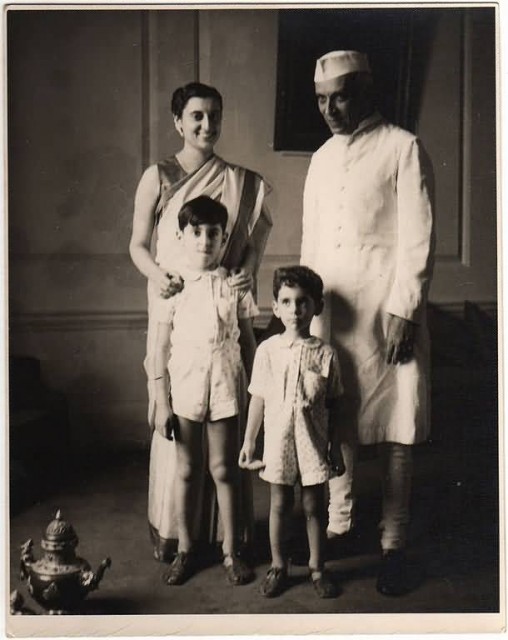
Indira Gandhi (Photo Credit: Royroydeb / Public Domain)
Morarji Desai
Morarji Desai was a notable Indian independence activist and the fifth Prime Minister of India from 1977 to 1979. He was also the first Prime Minister to head India’s first non-Congress Government. He held many important posts in the Government of India such as Chief Minister of Bombay State, Home Minister, Finance Minister and Deputy Prime Minister of India. At foreign fronts Desai holds international fame for his peace activism and made notable efforts to initiate peace between two-rival South Asian states Pakistan and India. After India’s first nuclear explosion in 1974 Desai helped restore friendly relations with China and Pakistan and vowed to avoid armed conflict such as Indo-Pakistani war of 1971.
Domestically he played crucial role in Indian nuclear program after it was targeted by major nuclear powers after conducting a surprise test in 1974. Morarji Desai closed down much of India’s premier intelligence agency Research and Analysis Wing and reduced its budget and operations. Morarji Desai indiscreetly told Pakistan’s Chief Martial Law Administrator General Zia ul-Haq that his government was well aware of Pakistan’s nuclear development which prompted the Pakistani government in removing all spies from around its nuclear research facilities and thus finally being successful in its nuclear dream.
Desai was the only Indian national to be conferred with Pakistan’s highest civilian award Nishan-e-Pakistan which was conferred on him by President Ghulam Ishaq Khan in 1990 in a colorful ceremony. Later his policies promoted social, health and administrative reforms in the country.
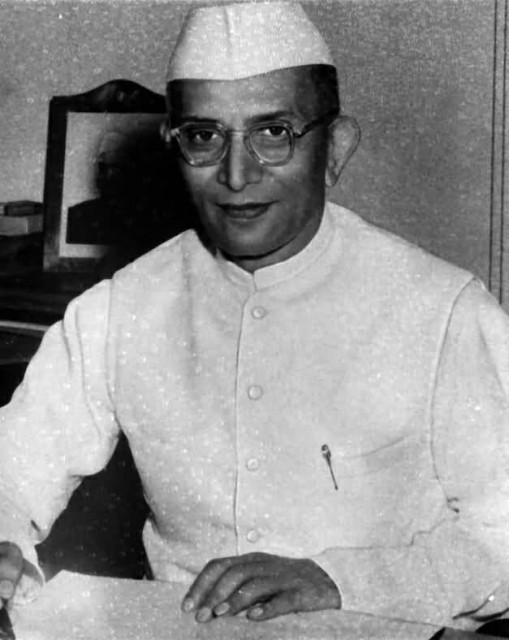
Morarji Desai (Photo Credit: Photo division Government of India / Public Domain)
Charan Singh
Chaudhary Charan Singh was the Fifth Prime Minister of the Republic of India serving from 28 July 1979 until 14 January 1980. Charan Singh was born in 1902 in village Noorpur of Hapur District in Uttar Pradesh. Charan Singh entered politics as part of Independence Movement motivated by Mohandas Gandhi. He was active from 1931 in the Ghaziabad District Arya Samaj as well as the Meerut District Indian National Congress for which he was jailed twice by the British. Before independence as part of the 1937 United Provinces Assembly he took deep interest in the state of laws that were detrimental to the village economy and he slowly built his ideological and practical stand against the exploitation of tillers of the land by landlords.
Chaudhary Charan Singh’s government did not face the Lok Sabha during his brief tenure as the Indian National Congress withdrew their support from his Government as he refused to agree to the terms of the Congress to protect Mrs Indira Gandhi and her associates from prosecution under the laws of the land. Charan Singh resigned and fresh elections were held six months later. He continued to lead the Lok Dal in opposition till his death in 1987.
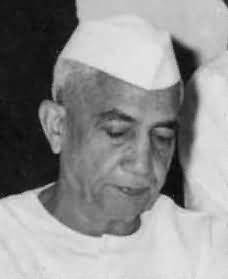
Charan Singh (Photo Credit: Sunilkhokhar / CC BY-SA 3.0)
Rajiv Gandhi
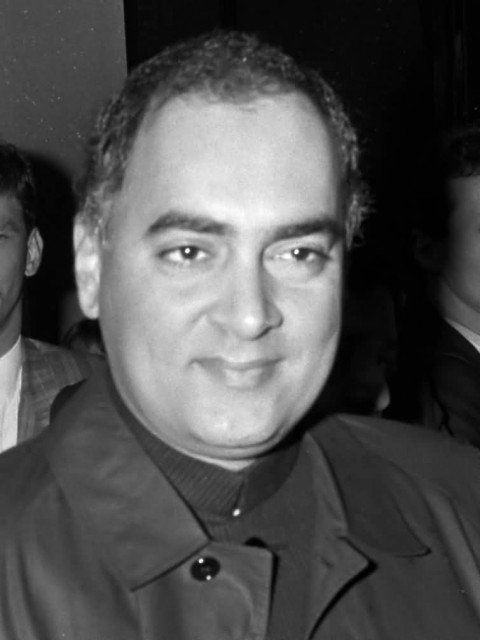
Rajiv Gandhi (Photo Credit: Bart Molendijk / Anefo / CC BY-SA 3.0)
Rajiv Ratna Gandhi was the seventh Prime Minister of India serving from 1984 to 1989. He took office after the 1984 assassination of Prime Minister Indira Gandhi his mother to become the youngest Indian prime minister. Rajiv returned to India in 1966 and became a professional pilot for the state-owned Indian Airlines. In 1968, he married to Sonia Gandhi and the couple settled down in Delhi to a domestic life with their children Rahul and Priyanka. In December of the same year he was elected as the president of Indian Youth Congress.
He also showed his organisational ability by working round the clock to make 1982 Asian Games a success. He was one of the 33 members of the Indian parliament who were part of the organising committee of the game but sports historian Boria Majumdar writes that being son of the prime minister he had a moral and unofficial authority over the others. The report submitted by the Asian Games committee mentions his drive, zeal and initiative for the outstanding success of the games. Gandhi increased government support for science and technology and associated industries and reduced import quotas, taxes and tariffs on technology-based industries especially computers, airlines, defence and telecommunications.
In 1986 he announced a National Policy on Education to modernise and expand higher education programs across India. He founded the Jawahar Navodaya Vidyalaya System in 1986 which is a Central government based institution that concentrates on the upliftment of the rural section of the society providing them free residential education from 6th till 12 grade. His efforts created MTNL in 1986 and his public call offices better known as PCOs helped spread telephones in rural areas. He introduced measures significantly reducing the Licence Raj in post-1990 period allowing businesses and individuals to purchase capital consumer goods and import without bureaucratic restrictions. Forbes India says that the seed for the information technology (IT) revolution was also planted during Rajiv Gandhi’s time.
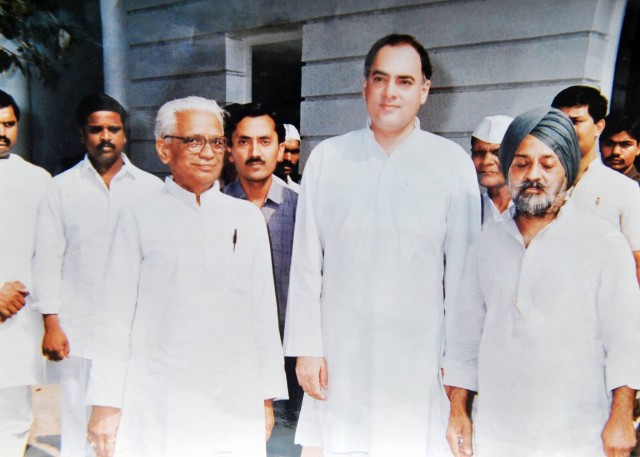
Rajiv Gandhi (Photo Credit: Santosh Kumar Shukla / CC BY-SA 2.0)
V. P. Singh
Vishwanath Pratap Singh Indian politician and government official was the eighth Prime Minister of India and the 41st nominal Raja Bahadur of the northern kingdom of Manda. Singh married Sita Kumari the daughter of the Raja of Deogarh-Madaria Rajasthan on 25 June 1955. It was an arranged marriage. He was 24 and she was 18. Vishwanath Pratap Singh is known for trying to improve the lot of India’s lower castes in his short term as Prime Minister.
Singh founded the Janata Dal by the merger of Jan Morcha, Janata Party, Lok Dal and Congress in order to bring together all the centrist parties opposed to the Rajiv Gandhi government and VP Singh was elected the President of the Janata Dal. Singh was renowned for his obsession with honesty and his willingness to sacrifice office. VP Singh died after a long struggle with multiple myeloma and renal failure at Apollo Hospital in Delhi on 27 November 2008. He was cremated at Allahabad on the banks of the River Ganges on 29 November 2008 his son Ajeya Singh lighting the funeral pyre.
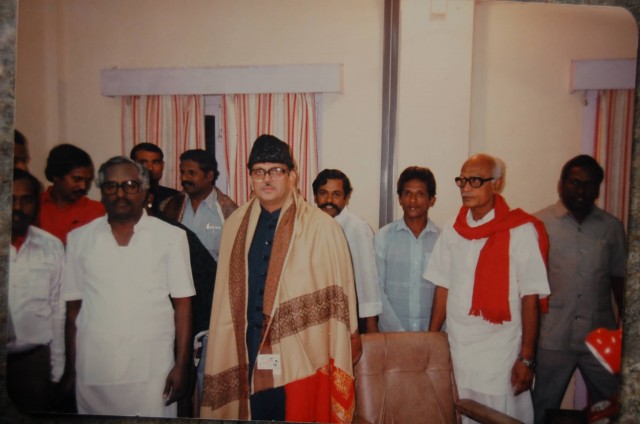
V. P. Singh (Photo Credit: Rsamy2008 / Public Domain)
Chandra Shekhar Singh
Chandra Shekhar Singh was the ninth Prime Minister of India. Chandra Shekhar Singh was born on 1 July 1927 in Ibrahimpatti a village in the Ballia district of Uttar Pradesh. His government was efficient and well-run during most of its brief tenure which included preamble and fighting of the Gulf War of 1990-91. However it could not introduce a full budget because Congress withdrew support during its formulation.
In the spring of 1991 former Prime Minister Rajiv Gandhi decided to precipitate a new election. Chandra Shekhar resigned the office of prime minister on 6 March 1991. Gandhi was then assassinated which gave the Congress Party enough momentum to secure a majority. Chandra Shekhar died at the age of 80 on 8 July 2007. He had been suffering with multiple myeloma for some time and had been in the Apollo Hospital at New Delhi since May.
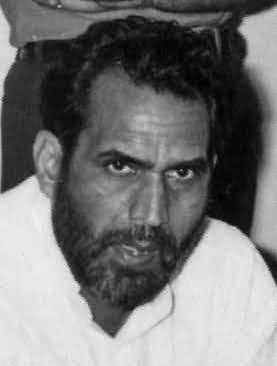
Chandra Shekhar Singh (Photo Credit: Sunilkhakhar / CC BY-SA 3.0)
P. V. Narasimha Rao
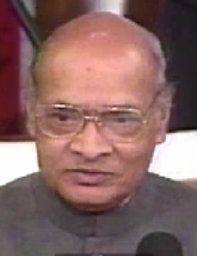
P. V. Narasimha Rao (Photo Credit: C-SPAN / Public Domain)
Pamulaparti Venkata Narasimha Rao was an Indian lawyer and politician who served as the tenth Prime Minister of India. His ascendancy to the prime ministership was politically significant in that he was the first holder of this office from non-Hindi-speaking south India. He led an important administration overseeing a major economic transformation and several home incidents affecting national security of India.
Rao who held the Industries portfolio was personally responsible for the dismantling of the Licence Raj as this came under the purview of the Ministry of Commerce and Industry. He is often referred to as the Father of Indian Economic Reforms. Rao accelerated the dismantling of the License Raj reversing the socialist policies of Rajiv Gandhi’s government.
11th President of India APJ Abdul Kalam described Rao as patriotic statesman who believed that the nation is bigger than the political system. Kalam acknowledged that Rao in fact asked him to get ready for nuclear tests in 1996 but it was not carried out as government at center got changed due to 1996 general election and it was later carried out by Vajpayee led NDA government. In fact Rao briefed Vajpayee on nuclear plans. Rao’s term also saw the destruction of the Babri Mosque in Ayodhya in Uttar Pradesh when BJP’s Kalyan Singh was CM which triggered one of the worst Hindu-Muslim riots in the country since its independence. Rao died in 2004 of a heart attack in New Delhi. He was cremated in Hyderabad.
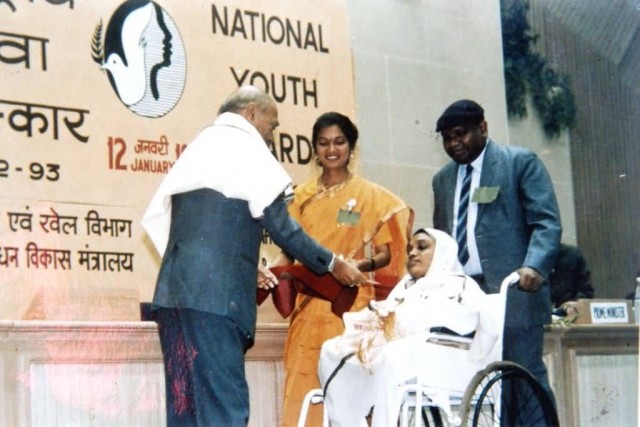
P. V. Narasimha Rao (Photo Credit: Nmkuttiady / CC BY-SA 3.0)
Atal Bihari Vajpayee

Atal Bihari Vajpayee (Photo Credit: EditorMarkJameBenson / Public Domain)
Atal Bihari Vajpayee is an Indian statesman who was the eleventh Prime Minister of India first for 13 days in 1996 and then from 1998 to 2004. A leader of the Bharatiya Janata Party, he is the first Prime Minister from outside the Indian National Congress party to serve a full five-year term. From 1975 to 1977. Vajpayee was arrested along with several other opposition leaders during the Internal Emergency imposed by Prime Minister Indira Gandhi of the Indian National Congress party. In 1977 heeding the call of social reformer Jayaprakash Narayan for all the opposition parties to unite against the Congress Vajpayee merged the Jana Sangh into the newly formed grand-alliance the Janata Party.
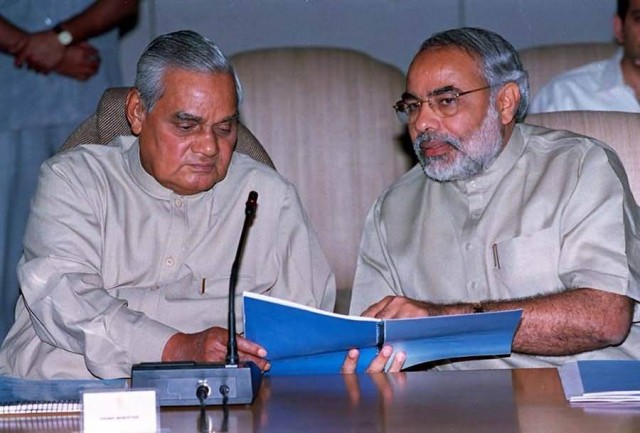
Atalbihari Vajpayee With Narendra Modi (Photo Credit: Narendra Modi / CC BY 2.0)
Vajpayee’s pet projects were the National Highway Development Project and Pradhan Mantri Gram Sadak Yojana. Vajpayee has visited several countries first in 1965 as a member of the Parliamentary Goodwill Mission to East Africa. He was also part of the Parliamentary Delegations to Australia in 1967 and also met with Russia’s president Vladimir Putin, the European Parliament in 1983, Canada in 1987 and America in 2001.
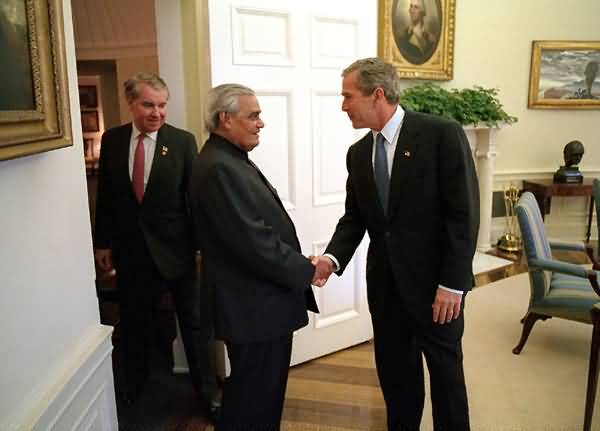
Atalbihari Vajpayee With Bush (Photo Credit: Emperor Genius / Public Domain)
H. D. Deve Gowda
Haradanahalli Doddegowda Deve Gowda is an Indian politician who was the 12th Prime Minister of India from June 1996 to April 1997. Previously he was the 14th Chief Minister of Karnataka from 1994 to 1996. He is a member of the 16th Lok Sabha representing the Hassan constituency of Karnataka is the National President of the Janata Dal party and enjoys strong support in Vokkaliga community which is at the forefront of the state politics.
The Janata Dal traces its roots back to the Janata Party founded by Jayaprakash Narayan who united all the opposition parties under one banner for the 1977 national elections. The Janata Dal was formed on the merger of the Janata Party with smaller opposition parties in 1988. Vishwanath Pratap Singh became the first Prime Minister of India from Janata Dal when he headed the National Front government in 1989. Later Deve Gowda and Inder Kumar Gujral too became prime ministers heading the United Front coalition governments in 1996 and 1997 respectively.
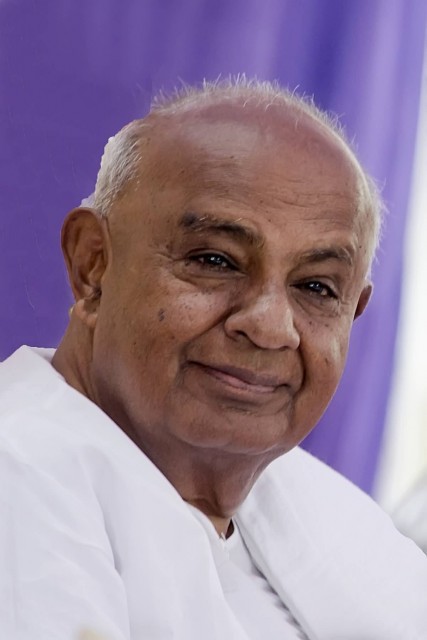
Deve Gowda (Photo Credit: Prathyush Thomas / GFDL)
I. K. Gujral
Inder Kumar Gujral was an Indian politician who served as the thirteenth Prime Minister of India from April 1997 to March 1998. Gujral was the third PM to be from the Rajya Sabha the first being Indira Gandhi and the second H. D. Deve Gowda. Gujral became vice-president of the New Delhi Municipal Committee in 1958 and joined the Congress party in 1964. He was close to Indira Gandhi and became a member of the Rajya Sabha in April 1964. During the emergency of June 1975 Gujral was Minister of Information and Broadcasting where he was in charge of the media during a time of censorship in India and was in charge of Doordarshan.
He again was selected to the Rajya Sabha to serve until 1976. He also served as Water Resources Minister. Later Gujral was appointed Ambassador of India to the Soviet Union by Indira Gandhi and stayed on during the tenures of Morarji Desai and Charan Singh. He was rumoured to have been shunted out of the ministry due to conflicts with the prime minister’s son Sanjay Gandhi over media censorship and was replaced by Vidya Charan Shukla who had no qualms following party lines on the matter he was then moved to the Planning Ministry. Gujral resigned from the Indian National Congress party in the 1980s. Then he joined the Janata Dal.On 27 November he fell unconscious and his urine output system stopped working. Gujral succumbed to his ailments on 30 November 2012.
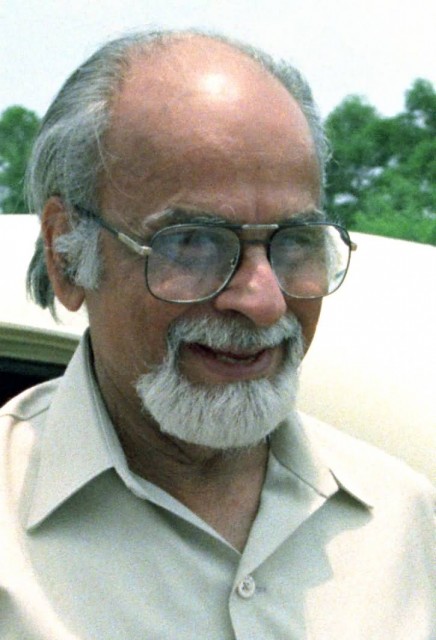
Inder Kumar Gujral (Photo Credit: Biswarup Ganguly / CC BY-SA 3.0)
Manmohan Singh
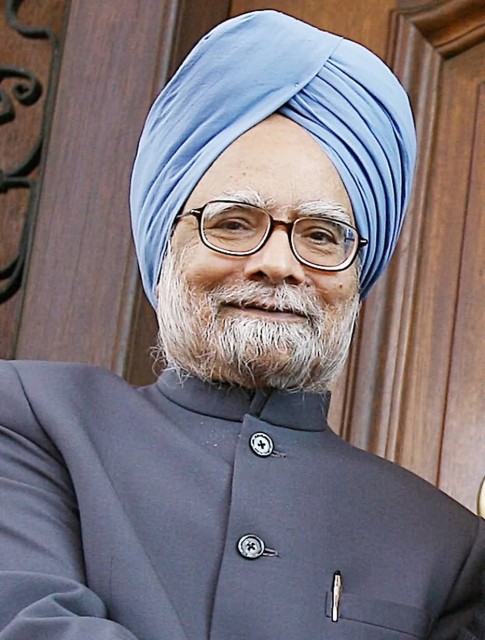
Manmohan Singh (Photo Credit: Ricardo Stuckert / CC BY 3.0)
Manmohan Singh is an Indian economist who served as the 14th Prime Minister of India from 2004 to 2014. The first Sikh in office and Singh was the first prime minister since Jawaharlal Nehru to be re-elected after completing a full five-year term. Born in Gah Singh’s family migrated to India during its partition in 1947. He subsequently began his bureaucratic career when Lalit Narayan Mishra hired him as an advisor in the Ministry of Foreign Trade. In 1991 as India faced a severe economic crisis newly elected Prime Minister P. V. Narasimha Rao surprisingly inducted the apolitical Singh into his cabinet as Finance Minister. In 2004, when the Congress-led United Progressive Alliance came to power its chairperson Sonia Gandhi unexpectedly relinquished the premiership to Manmohan Singh.
This Singh-led “UPA I” government executed several key legislations and projects including the Rural Health Mission Unique Identification Authority Rural Employment Guarantee scheme and Right to Information Act. In 2008 opposition to a historic civil nuclear agreement with the United States nearly caused Singh’s government to fall after Left Front parties withdrew their support. The 2009 general election saw the UPA return with an increased mandate with Singh retaining the office of Prime Minister.
Over the next few years Singh’s UPA II government faced a number of corruption charges over the organisation of the Common wealth Games the 2G-spectrum allocation and the allocation of coal blocks. After his term ended in 2014 he opted out from the race to the office of the Prime Minister of India during 2014 Indian general election. Singh was never a member of Lok Sabha but continues to serve as a member of the Indian Parliament representing the state of Assam in the Rajya Sabha for the fifth consecutive term since 1991.
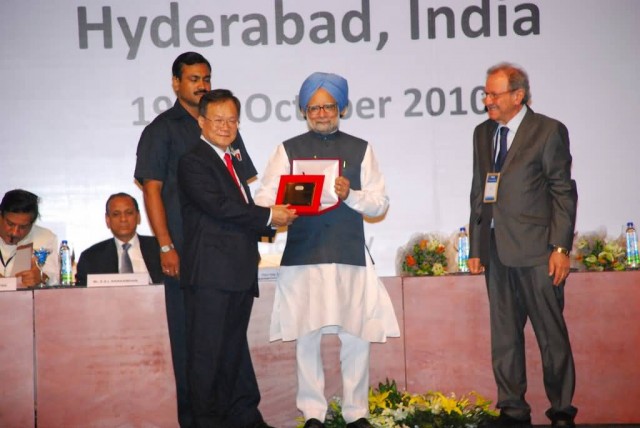
Manmohan Singh (Photo Credit: TWAS / CC BY-SA 2.0)
Narendra Modi
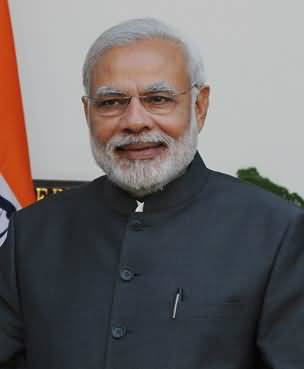
Narendra Modi (Photo Credit: Narendra Modi / CC BY-SA 2.0)
Narendra Damodardas Modi is the 15th and current Prime Minister of India, in office since 26 May 2014. Modi was born on 17 September 1950 to a family of grocers in Vadnagar Mehsana district Bombay State Modi a leader of the Bharatiya Janata Party was the Chief Minister of Gujarat from 2001 to 2014 and is the Member of Parliament from Varanasi. He led the BJP in the 2014 general election which gave the party a majority in the Lok Sabha a first for any party since 1984 and was credited for October 2014 BJP electoral victories in the states of Haryana and Maharashtra.
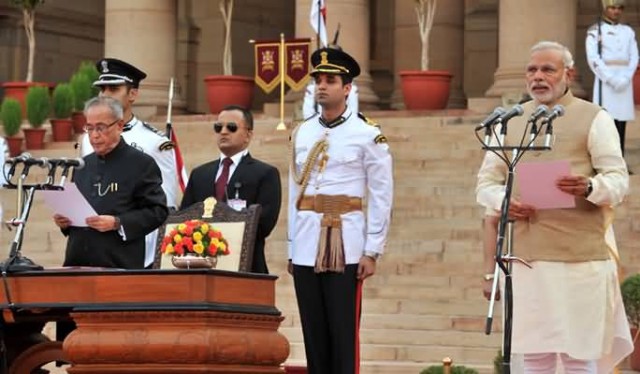
Narendra Modi (Photo Credit: Narendra Modi / CC BY-SA 2.0)
Modi addressing graduates at Gujarat National Law University. After his election as prime minister Modi resigned as chief minister and surrendered his MLA seat from Maninagar on 21 May 2014 after a speech described as emotional. Anandiben Patel was selected as his replacement. Modi was sworn in on 26 May 2014 at the Rashtrapati Bhavan. He was the first to invite all South Asian Association for Regional Cooperation leaders to attend his swearing-in ceremony. His first cabinet consisted of 45 ministers 25 fewer than the previous government.
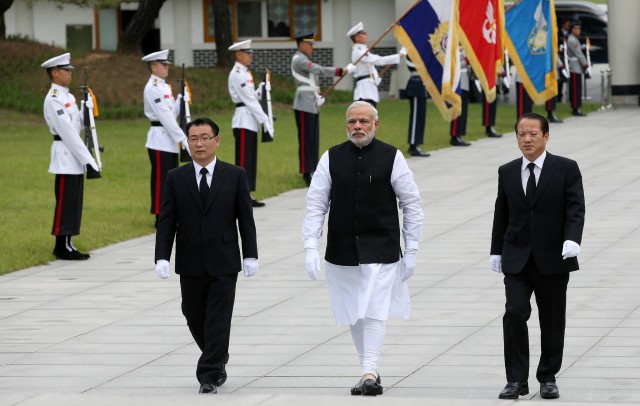
Narendra Modi (Photo Credit: Republic of Korea / CC BY-SA 2.0)

